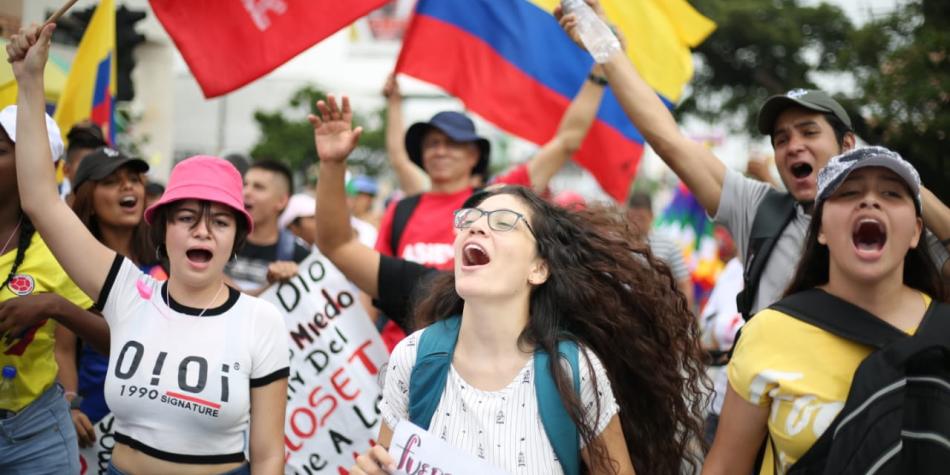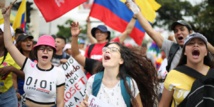In the central Bolivar Square, demonstrators displayed a huge portrait of young protester Dilan Cruz, who was shot by riot police on Saturday and died three days later.
Students, teachers, trade union and leftist party representatives and others attended rallies, displaying slogans such as: "Down with Duque" and "No more corruption." Protests were also reported in more than a dozen other cities.
Demonstrators clashed with police in the northern city of Bucaramanga, broadcaster Caracol reported.
But no widespread violent incidents were initially reported, unlike during last Thursday's nationwide marches, when 250,000 people protested alleged plans for labour and pension reforms, a funding shortage for education and killings of community leaders by armed groups.
Smaller protests have been held daily since then. Some of them also turned violent, escalating into clashes, looting and acts of vandalism. The demonstrations have claimed a total of at least four lives.
The National Strike Committee, which includes trade unions and civil society groups and which called the two nationwide marches, met with members of Congress on Wednesday after failing to make progress in talks with Duque the previous day.
Senate President Lidio Garcia called on Duque to open a "direct dialogue" with the committee, which has requested exclusive negotiations without the presence of business leaders, political parties and others taking part in the president's "national conversation."
"I totally disagree with the policies of this government," said journalist Yolanda Guerrero, 67, who spoke to dpa before attending a march in Bogota.
She mentioned "neo-liberal" economic policies, which she said favoured the rich, and the government's apparent reluctance to fully implement the 2016 peace deal with the former guerrilla movement FARC, some of whose members have taken up arms again.
"We claim our dignity, we are tired of being played around with," Guerrero said, calling the rallies "a cry of despair."
"The government has responded to the protests with repression and militarization," said film director David Munoz, who attended last week's demonstrations and was planning to participate again on Wednesday.
"The government has created an atmosphere of fear which is typical of a dictatorship," he told dpa, adding that only wealthy people could access quality health care and education in Colombia.
Duque has announced changes to an upcoming tax reform, including value added tax relief for low earners and reduced health insurance payments for retired people on small pensions.
But the National Strike Committee wants the government to scrap the entire reform and has presented a string of additional demands, including an agreement not to privatize state companies and the dismantling of the riot police Esmad.
The demonstrators also accuse Duque of not implementing key aspects of the peace deal that ended the 52-year conflict with FARC, such as the reintegration of former fighters into society and the development of rural areas to dissuade their residents from joining armed groups.
Large-scale protests were rare in Colombia until peace was achieved with FARC, because potential demonstrators feared that conservative governments could brand them as leftist guerrilla supporters, Guerrero said.
Colombians have meanwhile taken lessons from recent demonstrations in Chile and Argentina, adopting their "cacerolazos" or pot-banging protests which had not existed in Colombia, Munoz said.
----------------------------------------------------------------------------------------------------------------









 Home
Home Politics
Politics











